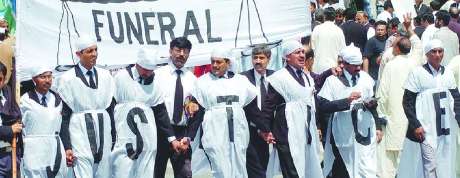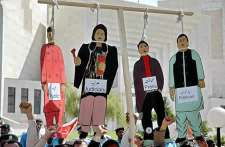Adil Najam
Over the last number of weeks now we have quietly followed the news on the Chief Justice’s removal case even as the paishis keep happening but also keep getting postponed.
That may happen again today but it should be clear by now to everyone that this issue is not going to die away and as it winds through the system, instead of other (very dramatic) news eroding the importance of this case, the symbolic value of Chief Justice Iftikhar Chaudhry’s stand is actually increasing.
The lawyers will be at the court once again today. Once again there is talk of protests and showdowns. Once again, the likely result is of hearings being postponed. But important events also continue unfolding even as this happens.
A few that are worth reminding ourselves of include:
A bench of the Supreme Court has now served notice on President Pervez Musharraf on the CJ’s petition challenging the filing of a reference against him.
Prominent lawyer Sharifuddin Pirzada has agreed to represent the government in the Supreme Court on the issue, after having declined to do so earlier.
PML-Q is planning a major demonstration in response to the anti-government demonstrations on the issue and, reportedly, has brought in its supporters from other cities for this. There are indications that we may be in for a ‘clash of the protestors’ today.
The National Assembly saw an uproar over the judiciary issue and there were heated exchanges between government and oposition leaders on the CJ issue; not surprisingly, Law Minister Wasi Zafar was in the forefront of trying to suppress the debate.
Chief Justice Iftikhar Chaudhry continues to attract much support and large crowds, especially within the lawyer community, including judges.
Acting Chief Justice Rana Bhagwandas continues to talk the nation ‘will hear good news soon’ line, but it remains clear what that might really mean.
Piecing together the puzzle and making sense of it all is, of course, leading to much speculation everywhere and by everyone. Much of it is exactly that – speculation. But one thing is clear; this case has taken on a life that is bigger than either Gen. Musharraf or Justice Iftikhar would have imagined it would have when things started unravelling three weeks ago.
























































According to latest news, Musharraf has called Shaukat and according to geo,’Important decisions’ could be taken soon.
The secularist MQM is in its true color and telling world the real face of Secularism and Liberalism. Thanks MQM! your goons are actually being a demo of KHILASHANKOFI shariyat. May you and your supporters get the statu and “fame” which was earned by Hitler and Phararoah.
Wasiq:
I am sorry but your comments are based on too many false assumptions.
“The problem is “ordinary peopleâ€
Every thing will be settled very soon. The deal between the dictator and the secular politician is progressing according to the wishes of the well-wishers (US and UK) of Pakistan.
The deal between B and M is the first news of this week’s newsweek (April 30, 2007, page 4).
http://www.msnbc.msn.com/id/18246435/site/newsweek /
I suppose that this should be regarded as a very very important development, as far as the protests against the suspension of the Chief Justice are concerned.
KARACHI, April 24: Lawyers, politicians and representatives of trade unions, labour federations, doctors’ associations and non-governmental organisations took out processions that converged as a large rally on the Karachi Press Club on Tuesday as the Supreme Judicial Council heard a presidential reference against Chief Justice Iftikhar Mohammad Chaudhry in Islamabad.
Protesting against the suspension of CJP, lawyers in the Sindh High Court, City Courts, and Malir district courts stayed away from the court proceedings. Followed by leaders and workers of the Pakistan People’s Party, Pakistan Muslim League (Nawaz), Muttahida Majlis-i-Amal, Pakistan Tehrik-i-Insaf, Awami National Party and Sindh Taraqi Pasand Party as well as representatives of the Pakistan Medical Association, National Labour Federation and National Trade Union Federation, the lawyers staged protest demonstrations on Hassan Ali Effendi Road.
They marched on Shahrah-i-Liaquat and Sir Ghulam Hussain Hidayatullah Road where SHCBA and MBA members joined the procession and held a big demonstration in front of the Karachi Press Club.
Holding placards and banners inscribed with their demands and slogans, besides national flags and portraits of Quaid-i-Azam Mohammad Ali Jinnah, the protestors raised slogans in support of the media and the CJP.
The rally was addressed by Pakistan Bar Council members Abul Inam and Yasin Azad, Sindh Bar Council vice-chairman Mohammad Amin Lakhani, SBC member Zia Ahmed Awan, Sindh High Court Bar Association president Abrar Hasan, former general-secretary of SHCBA Moin Azhar, KBA president Iftikhar Javaid Qazi, general-secretary Naeem Qureshi, KBA members Mohammad Ali Abbasi, Naheed Afzaal, and Malir Bar Association vice-president Mohammad Ashraf Samoo.
The political leaders who addressed the rally included Nafees Siddiqui, Siddique Rathor, Dr Merajul Huda Siddiqui, Saleem Zia, Ali Hassan Chandio, Nasrullah Shaji, Shahi Syed, Mamnoon Hassan, Zubair Khan and Comrade Akhtar Hussein.
The speakers came hard on President General Pervez Musharraf saying that there was no logic for suspending the country’s top judge.
They alleged that the action was taken by the president only to prolong his tenure. They said the lawyers’ campaign would come to an end only after the removal of the president.
They said government employees dressed as lawyers were sent to disturb the processions, but failed to do so. Ironically, the tactics used by the government machinery united the lawyers against ‘unconstitutional acts’, they said.
The lawyers said despite its tall claims of press freedom the government was imposing restrictions on the media. The issuance of notice to a TV channel was a glaring example of the government’s anti-press freedom policies, they said, adding that they were ready to defend the media in the courts through a panel of senior lawyers.
They said the lawyers would not bow down to government pressure, adding that they were mentally prepared to run the campaign at least for one year.
They hailed the response of the political parties and other organizations, terming it a referendum for the independence of the judiciary.
The lawyers said the government should realise that they were not alone in the struggle for the supremacy of the judiciary. Most people in the country wanted the independence of the judiciary and reinstatement of Chief Justice Iftikhar Chaudhry. They said the participation of High Court judges at his reception in Hyderabad and Peshawar was a clear reflection of the judiciary’s confidence in the CJP.
In solidarity with the lawyers, the ANP leaders including their provincial president also observed a token hunger strike in front of the Karachi Press Club.
Earlier, SHCBA members Ghulam Qadir Jatoi, Abdul Qadir Leghari and Naseer Khan observed a token hunger strike in the bar room. KBA members M. Noman Khan, Chaudhry Abdul Sattar, Sadat Hassan, A.D. Khaskheli, G.H. Niazi, Akhtar Saeed Shaikh, Inayat Bugti, Shahbaz Ali Shah, Mumtaz Ali, Tahir Hussain and Ihsan Ali also observed a token hunger strike in the City Courts.
Meanwhile, the Human Rights Committee of the Sindh Bar Council through a resolution condemned the Pakistan Electronic Media Regulatory Authority for issuing a notice to Aaj TV. The resolution stated there was no need for such a department which was depriving the media of its constitutional rights. The committee’s chairman, Advocate Aaqil Lodhi, said the notice to the channel was sent in violation of the Human Rights Charter No 18-19 of the United Nations.
Dawn
There are no entry barriers for ordinary people, just success barriers.
Everyone can enter politics but not everyone can succeed. Only if the good people join politics, persist and accept that things will not change overnight then slowly the hold of the existing leaders will weaken.
Take the example of India. Instead of sitting on the sidelines, India’s intelligentsia joined existing political parties with all their flaws. Congress was dominated by Nehru-Gandhi family, the Communist parties had their own limitations and the BJP is a communalist party. But the process has continued and as a result, India has both a braod middle class and a significant role for the middle class in politics.
Manmohan Singh, an economist, joined Congress, got elected as Member of Parliament, sat in opposition and now is Prime Minister. Ordinary man.
In Pakistan, people like him don’t want to “dirty their hands” in politics. They don’t join regular political parties and just wait for a caretaker regime or military government to become ministers.
The problem is “ordinary people” (by which you probably mean educated, English-speaking pakistanis like us) want political change but do not have the patience or stomach for politics.
It is like Imran Khan complaining that going in jalsas and processions makes him sweaty and he has to change his shirt many times.
Politics requires that we step out of air conditioned rooms, guys and be prepared to be controversial, even abused.